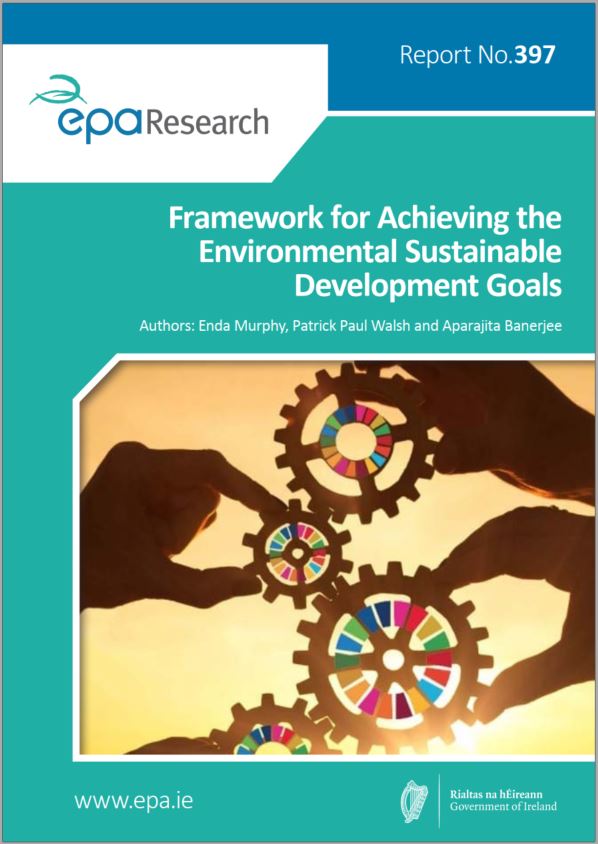
Authors: Enda Murphy, Patrick Paul Walsh and Aparajita Banerjee, December 2021
Year: 2021
This report contributes to a range of international and national policy areas, creating a positive feedback loop between policies for environmental SDG promotion, governance for the SDGs and integrated environmental policymaking. It provides an important evidence base for assessing national progress on the environmental SDGs relative to EU peer nations. This is the first time that Ireland’s progress on the SDGs has been assessed on an SDG target and indicator basis relative to peer nations.
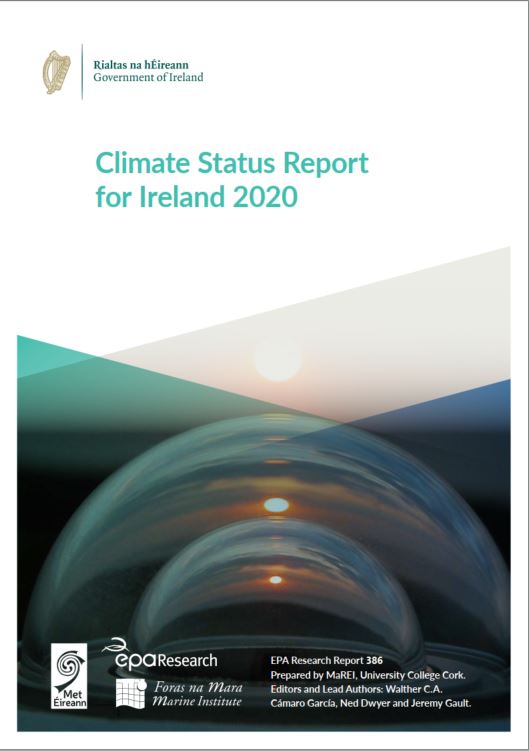
Editors and Lead Authors: Walther C.A. Cámaro García and Ned Dwyer, August 2021
Year: 2021
As an island on the western boundary of Europe facing the Atlantic Ocean, Ireland is ideally positioned to measure and assess ongoing climate change. The first Status of Ireland’s Climate report was published in 2013. This second status report provides an update, incorporating new datasets and analyses as well as reporting ongoing climate observations over the last 7 years.
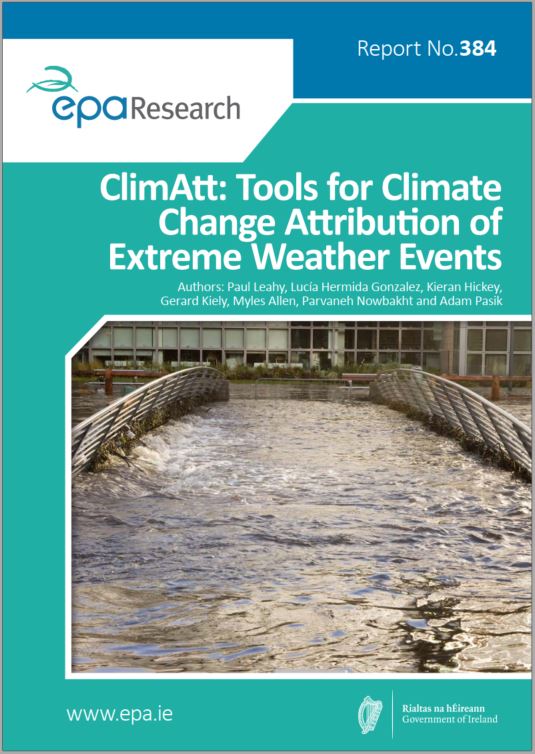
Authors: Paul Leahy, Lucía Hermida Gonzalez, Kieran Hickey, Gerard Kiely, Myles Allen, Parvaneh Nowbakht and Adam Pasik, July 2021
Year: 2021
Extreme weather events, such as heavy or prolonged rainfall events, droughts and heatwaves, have the potential to cause significant social and economic disruption in Ireland. The ClimAtt project has examined the state of the art in climate change attribution of extreme weather events. Met Éireann’s observational records have been used to test and validate several climate model datasets for attribution purposes. The most appropriate datasets and methods to use to investigate the influence of climate change on extreme weather events occurring in Ireland have been recommended.
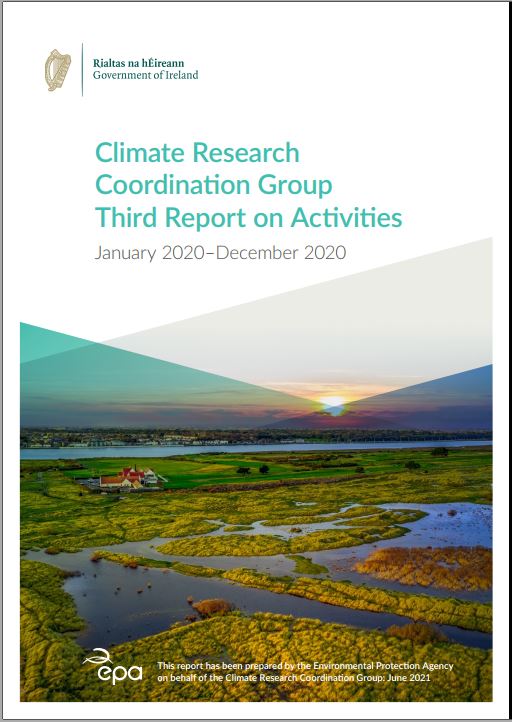
This report has been prepared by the EPA on behalf of the Climate Research Coordination Group, July 2021
Year: 2021
This third report presents a summary of the Climate Research Coordination Group’s activities in 2020.
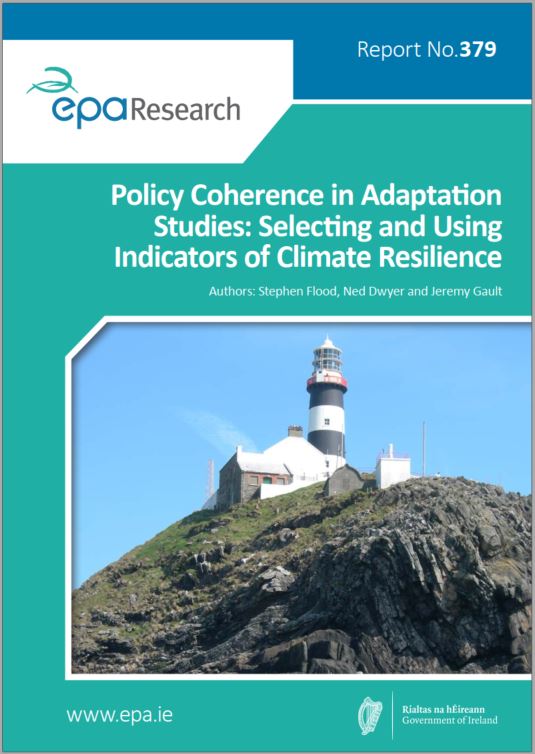
Authors: Stephen Flood, Ned Dwyer and Jeremy Gault, June 2021
Year: 2021
Adaptation action is now urgently needed to reduce the social, economic and environmental impacts of present and future climate change to ensure resilience to both extreme and slow-onset events under a changing climate. This project combines an analysis of international best practice and approaches to the development of climate adaptation indicators, co-designed by key stakeholder representatives from relevant state agencies and regional and national government, to identify a tailored suite of Ireland-relevant climate adaptation indicators. The co-design process identified a suite of 127 recommended indicators – 15 are climatological indicators, 23 are impact indicators, 32 are implementation indicators and 21 are outcome indicators. Ninety-one of these indicators were identified as priority.
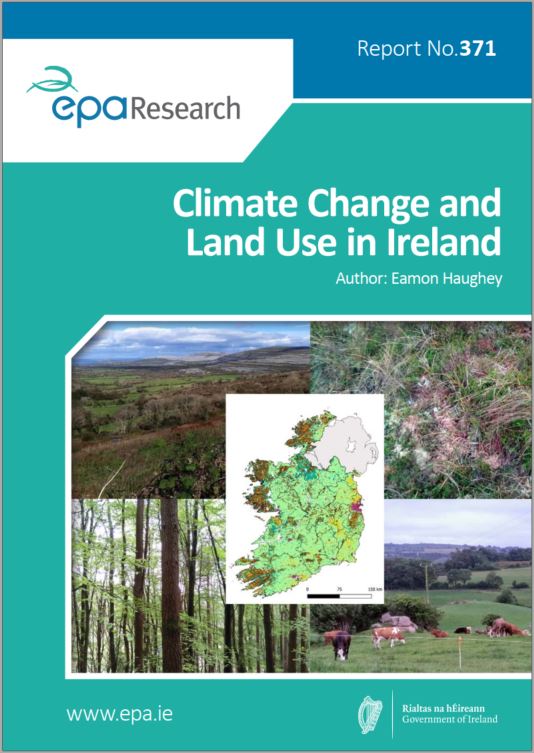
Author: Eamon Haughey, May 2021
Year: 2021
Land supports a range of ecosystem services including biodiversity and economic outputs in the agriculture and forestry sectors. This report identified pressures in the land system by analysing land use and outputs and greenhouse gas emissions associated with the land system. It identifies knowledge gaps in relation to national land use mapping, which currently limit the potential for regional analyses of land–climate interactions.
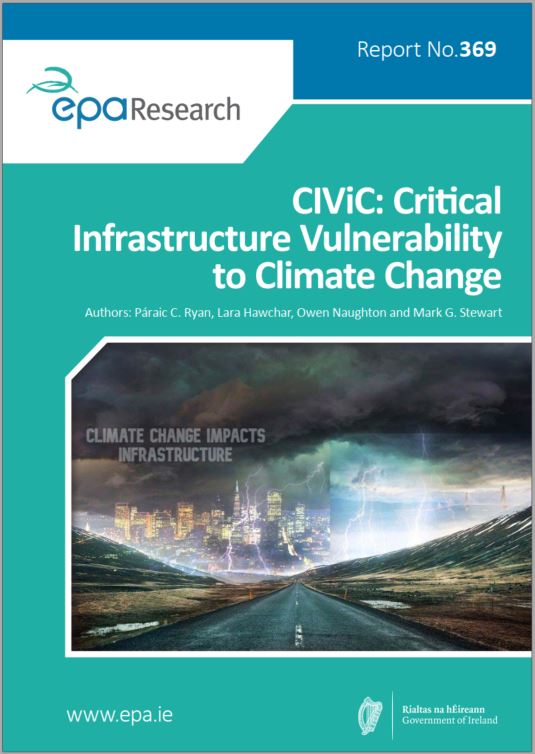
Authors: Páraic C. Ryan, Lara Hawchar, Owen Naughton and Mark G. Stewart, March 2021
Year: 2021
Modern society relies on the effective functioning of critical infrastructure networks to provide public services, enhance quality of life and spur sustainable economic development. Part A of this report presents a framework and analysis aimed at identifying potential risks for the four main critical infrastructure sectors. Part B of the report was applied to part of the energy sector as an illustrative case study.
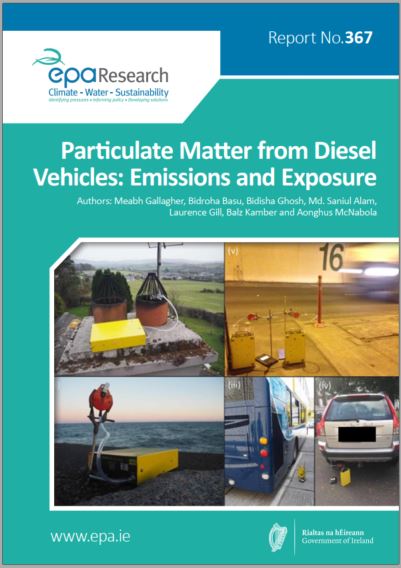
Authors: Meabh Gallagher, Bidroha Basu, Bidisha Ghosh, Md. Saniul Alam, Laurence Gill, BalzKamber and Aonghus McNabola, February 2021
Year: 2021
Research was conducted to assess the contribution of diesel vehicle emissions to the concentrations of PM2.5 in Dublin. The major source identified was solid fuel burning, contributing 46-50% of the total mass recorded. The 2nd largest contributor at a roadside site was diesel vehicle emissions (22%) followed closely by road dust (19%). The 2nd largest source at a suburban site was soil (20%) followed closely by sea spray (14%).
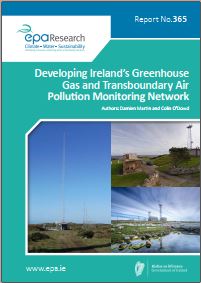
Authors: Damien Martin and Colin O’Dowd, January 2021
Year: 2021
The Atmospheric Composition and Climate Change (AC3) network is an established national research and monitoring infrastructure developed incrementally. It monitors greenhouse gases, short-lived climate forcers, and aerosol chemical and physical characteristics in line with best practice from pan-European and global monitoring programmes. This fellowship has enabled and sustained scientific operations for a national monitoring network.
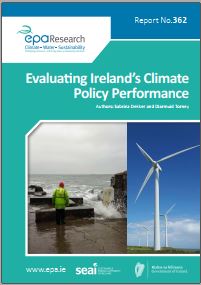
Authors: Sabrina Dekker and Diarmuid Torney, January 2021
Year: 2021
To date, Ireland’s climate change policy response has not delivered sufficient progress. The central objectives of this project were to construct a policy evaluation framework that builds on a standard EU evaluation framework and to undertake evaluations of climate change policies across all sectors using the framework, with a specific focus on key policies.
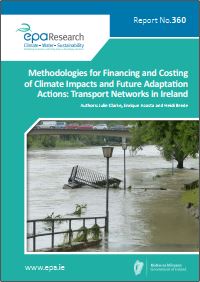
Authors: Julie Clarke, Enrique Acosta and Heidi Brede, January 2021
Year: 2021
Climate change is happening on a global scale, and Ireland is seeing its detrimental effects. Increased stress owing to changing weather patterns and extreme storm events is and will have an impact on the transport infrastructure network. Developing resilient methodologies that quantify the social, economic and environmental costs of climate change impacts can support a decision-making framework and provide cost effective solutions.
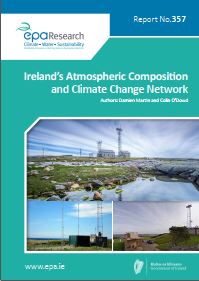
Authors: Damien Martin and Colin O’Dowd, November 2020
Year: 2020
The Atmospheric Composition and Climate Change network is a valuable established national research and monitoring infrastructure. This fellowship has enabled and sustained scientific work on a national monitoring network. Infrastructure has been continually developed over the course of the fellowship that will facilitate long-term sustainable measurements.
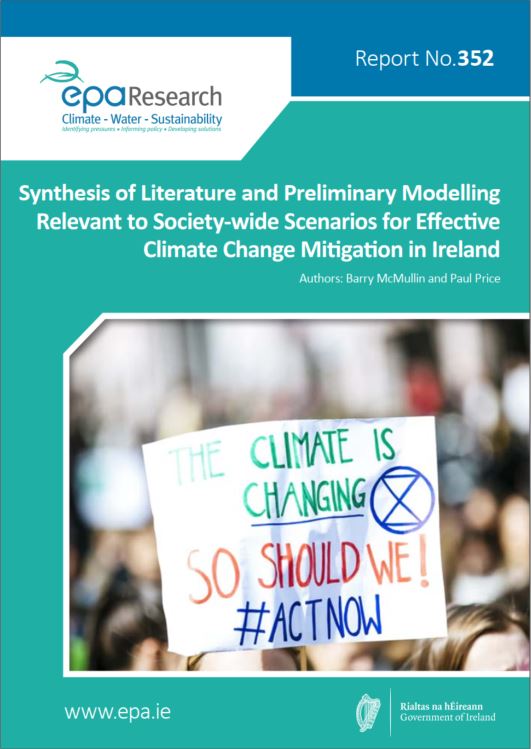
Authors: Barry McMullin and Paul Price, November 2020
Year: 2020
Rapid global warming due to emissions of greenhouse gases (GHGs) caused by human activities is negatively affecting global climate and ecological systems. This research assesses the international literature to inform climate mitigation policy in Ireland and provides a preliminary tool for comparing policy within the Paris Agreement commitments.
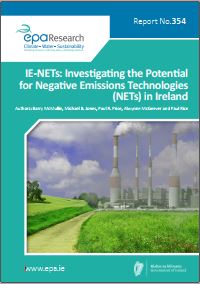
Authors: Barry McMullin, Michael B. Jones, Paul R. Price, Alwynne McGeever and Paul Rice, November 2020
Year: 2020
It is now scientifically understood that effective climate action sets a finite limit on total future net emissions of carbon dioxide (CO₂) from human activities, and may require dependence on large-scale “negative emissions” or CO₂ removal from the atmosphere. The IE-NETs project provides the first review of the technical potential for CO₂ removal in Ireland and an assessment of the security of long-term carbon storage.
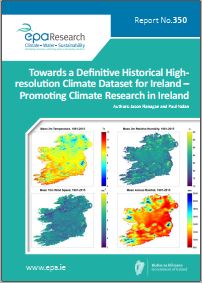
Authors: Jason Flanagan and Paul Nolan, October 2020
Year: 2020
There is strong and constant demand from various sectors for long-term, high-resolution gridded climate datasets. This report describes the available datasets and how, using a variety of available observational datasets, appropriate uncertainty estimates and skill scores have been calculated for the model outputs.
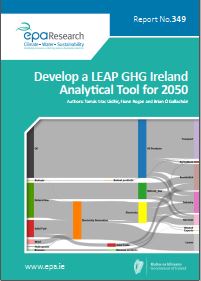
Authors: Tomás Mac Uidhir, Fionn Rogan and Brian Ó Gallachóir, October 2020
Year: 2020
This report describes a greenhouse gas (GHG) emissions model of Ireland’s energy and agriculture sectors, which were responsible for approximately 61 million tonnes (Mt) of GHG emissions in 2017. The Low Emissions Analysis Platform (LEAP) software was used to build the LEAP Ireland 2050 model, which simulates the development of future possible decarbonisation pathways for Ireland.
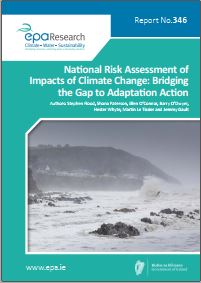
Authors: Stephen Flood, Shona Paterson, Ellen O’Connor, Barry O’Dwyer, Hester Whyte, Martin LeTissier and Jeremy Gault, October 2020
Year: 2020
Ireland’s climate is changing in line with global trends and this trend is expected to continue. This report presents its findings according to the NAF’s four themes: natural and cultural capital, critical infrastructure, water resources and flood risk management, and public health. The impacts of climate change will have direct relevance to the achievement of planning and development objectives and priorities within these themes.
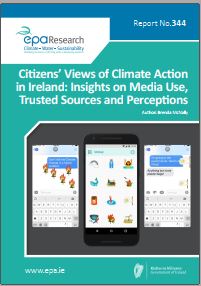
Author: Brenda McNally, September 2020
Year: 2020
As the physical impacts of climate change become more urgent and the subject of wider public concern, greater understanding of the societal responses will be needed. This project investigated citizens’ views of and media consumption about climate actions in Ireland. The report supports environmental policymaking by providing data to tailor communication about climate action and to broaden citizen engagement with climate change.
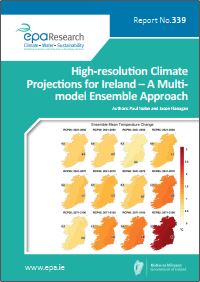
Authors: Paul Nolan and Jason Flanagan, September 2020
Year: 2020
In this study, regional climate models were employed to dynamically downscale the coarse information of Global Climate Models to provide detailed projections of 21st-century regional climate change in Ireland. The projections were run at high spatial resolution (4 km grid spacing), allowing a more accurate evaluation of the local impacts of climate change.

Authors: Brian Caulfield, Paraic Carroll, Shreya Dey, Bidisha Ghosh and Aoife Ahern, August 2020
Year: 2020
The Greening Transport project examined the behavioural response of commuters within the Greater Dublin Area, to a range of policy incentives to encourage travellers to make greater usage of sustainable travel modes for trips to places of work or education. The results suggest that policy incentives alone could lead to tangible improvements in commuting time and cost constitute valuable guidance and recommendations for policymakers.